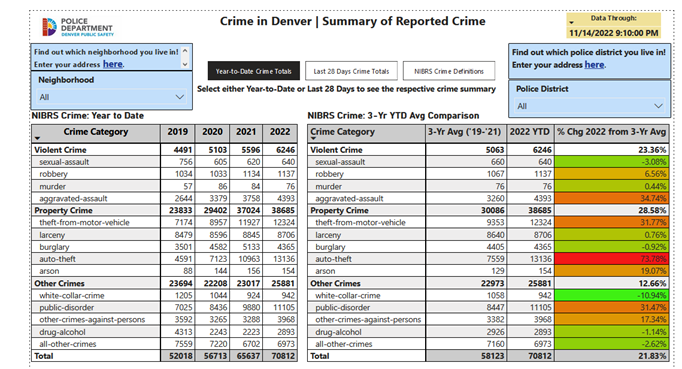If violent crime is up, why aren’t we filing more violent crime cases?
Protecting public safety and holding violent criminals accountable is our top priority and the priority of every single prosecutor in the Denver District Attorney’s Office. We know from the 2022 midterm election results that violent crime was a topic most registered voters saw as a very important issue (Pew Research Center report, Violent crime is a key midterm voting issue, but what does the data say?).
Our dashboard allows users to explore by both year and by quarter the number of felony cases we filed for prosecution involving a violent crime charge. What our data shows is that violent crime case filings are relatively consistent year-over-year. If violent crime is up, the question becomes, why are our violent crime case filings relatively flat?
There are several reasons for this. One important one is that the Denver Police Department’s data reflects reports of crime but not crimes that are solved. My office cannot file a case unless we know who to charge and have evidence to prove that person’s guilt. For example, a car is stolen from someone’s driveway. The car may be discovered a few days later somewhere else in the metro area and the owner may get their car returned. However, if we cannot prove who stole the car, we cannot file a case. Simply put, our data is based on cases we can prove in court, not reports that a crime occurred.

The vast majority of the violent crime cases we prosecute are the result of the hard work of the Denver Police Department which has been hit like so many police departments nationwide with staffing shortages. Another theory that may explain the data is that that as the Denver Police Department hires more officers (their ranks are again growing) we will see a correlating increase in violent crime cases presented to us for filing. Time will tell if this theory is correct.
As to why reports of crime are increasing, those who study crime have various theories as to why crime rates are escalating nationwide: the effects of the pandemic including closing social gathering places, economic decline, anger, the impacts of social media, woeful lack of adequate resources for mental health and substance misuse treatment. The unfortunate truth is that crime is up just about everywhere in this country – including here in Denver. And with the midterm elections now behind us, it is worth repeating that there is zero evidence that progressive policies are what’s driving the nation’s crime increase, zero.
The data on violent crime case filings is a good example of why we need to review and monitor our data through our data dashboard. We can now keep a close eye, as can the public, on the number and kinds of cases we are filing and the dispositions of cases. Let us know what you think by writing to us at info@denverda.org.
The Growth of Denver's Diversion Programming
District attorneys yield great power to decide who gets a second chance through alternative programs and who goes through the traditional criminal justice system. DA McCann believes that community well-being and public safety are sometimes best served when people who do not present a danger to the public but have committed low-level offenses are given an alternative to incarceration.
When she became DA, the office had a Juvenile Diversion Program, but not one for adults. District Attorney McCann launched the office’s Adult Diversion Program in May of 2018. The primary goals of both the Adult and Juvenile Diversion Programs are to prevent further contact with the police and criminal justice system, address underlying issues that led to the offense, and provide a cost-saving alternative to traditional prosecution. The programs provide culturally-competent services that repair the harm to victims and the community, increase the offenders’ social competency skills, and reduce the likelihood of that persons’ further involvement in the criminal justice system.
In designing the Adult Diversion Program, it was very important to District Attorney McCann that the program keep accurate demographic data to ensure that the racial and ethnic backgrounds of the program participants reflect Denver’s population in the criminal justice system. The dashboard helps us monitor whether we are meeting our longstanding goal of having diversion programs reflect the racial and ethnic population in the city’s criminal justice system. It is imperative that these programs operate with inclusivity every step of the way and our dashboard enables improved transparency and monitoring of our efforts.
Moreover, both programs boast impressive recidivism rates: 3% for adults and 5% for juveniles. Recidivism is completed one year and three years after a client successfully terminates from Diversion. If there is a new misdemeanor or felony conviction at the one or three year mark it is counted as a new charge. It is worth noting that approximately 50% of both adult and juvenile clients received mental health and/or substance use treatment as part of the diversion programs and upon successful program completion all participants avoided having a criminal record. The program assists successful participants in having their records sealed (adults) or expunged (juveniles).
Because of the success of the Adult Diversion Program, and through collaborative partnerships with various city agencies, the office obtained several grants to expand. Starting in the 2022-2023 school year, the juvenile program will support a Gang Prevention Coordinator position who will be present in the Denver Public Schools to help direct young people away from criminal activity and support healthy lifestyles.
We are very proud of these diversion programs and believe they are an excellent alternative to the traditional system. These programs prevent future crime and definitely help people make better choices in their lives that keep them from further contact with the criminal justice system.
For more about Denver’s diversion programs read our annual report for the latest information.